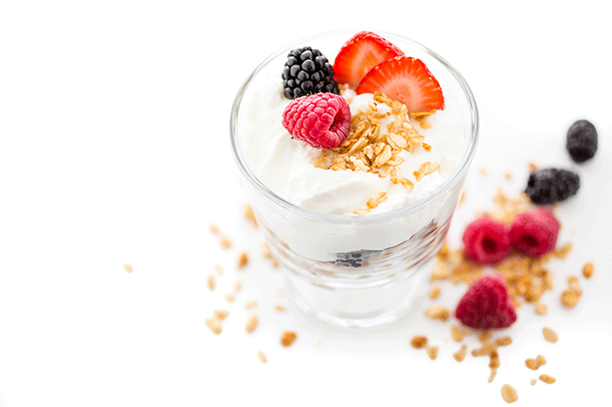If you’ve stepped foot in a grocery store recently you may have noticed the explosion of products in the yogurt section. Some stores even have an entire aisle dedicated to yogurt! A lot of this growth can be contributed to Greek yogurt.
What makes Greek yogurt different from regular yogurt you might ask? Greek yogurt is made simply by straining the yogurt to remove the whey (the liquid you find remaining after the milk has curdled). This results in a more solid yogurt that has less sugar, fewer carbohydrates, and more protein compared to regular yogurt. However, like regular yogurt, Greek yogurt is a natural source of probiotics which are healthy bacteria that help regulate your digestive system. Greek yogurt provides all of the healthy benefits of yogurt plus an additional punch of more protein to help you fill you up and feel full longer!
There are many ways you can add yogurt into your daily eating routine, such as
- Swap sour cream in recipes for plain Greek yogurt.
- Use a dollop of yogurt on soups, chilies, and stews to give a creamy taste and texture.
- Eat Greek yogurt as a post workout snack. The ratio of carbs to protein is perfect to help your body recover
from a good workout. - Chop up a variety of your favorite fruits and mix with Greek yogurt for a delicious fruit salad.
- Have a serving of Greek yogurt as a dessert. There are lots of yummy and delicious flavors of Greek yogurt
that will trick your taste buds into thinking they are getting a special treat!
It’s a little unclear why Greek yogurt is called Greek Yogurt. Even though it’s only been showing up on grocery store shelves in the US over the past 5 years, it appears to have originated centuries ago in the Middle East. Even though it’s “Greek”, it is not actually coming from Greece! It can also be called and referred to as strained yogurt.
When selecting a yogurt choose one that has no more than 20 grams of sugar per serving, is low fat or nonfat, and contains probiotics in the ingredients list such as L. acidophilus, B. bifidum, or L. casei.







